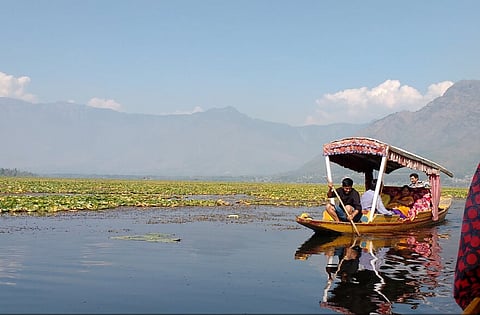

The novel coronavirus disease (COVID-19) pandemic has been a death warrant for the tourism industry in Kashmir: Thousands of families that rely on tourism and allied sectors have been out of work and struggling to stay afloat.
The pandemic has exacerbated the situation for Kashmir’s floundering tourism industry, which has repeatedly suffered shocks in the last three decades. Violence and turmoil have remained deeply woven in its political fabric.
Nestled in the lap of Himalayas, Kashmir is an acclaimed tourist destination for national and international tourists. Dal Lake and mountain resorts such as Gulmarg, Pahalgam and Sonamarg are among the major attractions. Hospitality and tourism are, in fact, a part of Kashmir valley’s tradition, culture, and economic development — though horticulture and agriculture employ people across the valley.
The tourism sector is a significant contributor to Jammu and Kashmir’s economy and accounts for around seven per cent of the region’s gross domestic product, according to Jammu and Kashmir government’s estimates.
But, is it possible to resume tourism when the COVID-19 crisis continues to betray all signs of improvement? India reports around 90,000 cases positive to novel coronavirus SARS-CoV-2 on a daily basis on an average; Jammu and Kashmir reports around 1,000 COVID-positive cases on a daily basis.
“It is important to restore tourism activities in Kashmir; it is highly critical for livelihoods of millions of people,” said Noor Mohammad Shungloo, vice-president of Pleasure Leisure Tour Operators’ Forum (PLTOF).
He added that there was a need to learn to deal with the pandemic — but with precautions. “We cannot wait till the last case. We would be inflicting huge economic and psychological damage on ourselves,” Shungloo said.
He said if basic precautions such as wearing masks, adhering to social distancing norms and carrying out testing are observed properly, “resuming tourism activities would be possible.”
The tourism department of Kashmir, too, is trying hard to get back on its feet. Those associated with the industry are keen to do their bit to make it happen, according to Shungloo.
Director of tourism Nisar Ahmad said the department is putting in all efforts to facilitate tourist arrivals in Kashmir. “We are aware people belonging to the industry are suffering. Be it a Shikara wallah, a taxi wallah, a hotel owner or travel agent — all of them are suffering,” he said.
Director of tourism Nisar Ahmad said the department is putting in all efforts to facilitate tourist arrivals in Kashmir. “We are aware people belonging to the industry are suffering. Be it a Shikara wallah, a taxi wallah, a hotel owner or travel agent — all of them are suffering,” he said.
“The tourism department has come up with a list of standard operating procedures (SOPs) for resumption of tourism. Now, all of us, including the police, have to cooperate,” Shungloo said. Among the important SOPs issued are social distancing, rampant testing, 24-hour quarantine and pre-booking.
Saleem Beg, former director-general of Jammu and Kashmir’s tourism department, said Kashmir has the advantage of having spread-out tourist attractions in north, south and central regions.
“Tourism here is not confined to densely populated areas like Srinagar where people are either in crowded places or stay inside their rooms. We have Gulmarg and Pahalgam, where tourists can be in huge, open spaces as well as stay inside buildings,” Beg said.
He added that though “they have lost the summer, tourism could still be revived in Kashmir”.
Zahoor Ahmad Trumboo, a hotel owner and one of the main tourism players in Kashmir, said those dependent on the sector suffered hugely under circumstances followed by the abrogation of Article 370 in 2019.
“Most of them have been without livelihoods for a year now. The boatmen are now selling barbecues, vegetables and fruits on the roadside. But there aren’t many buyers,” he said.
He added: “If you couldn’t sell a carpet or shawl today, you may be able to sell them tomorrow. But if my hotel room is not booked for a day, it means I lose the day. The same applies to a houseboat owner, a pony owner, a hawker and all those associated with tourism,” he observed, adding the industry needed a financial package to cushion the economic impact of the pandemic.
The story is being published as part of CMS-BEEP Media Fellowship Programme